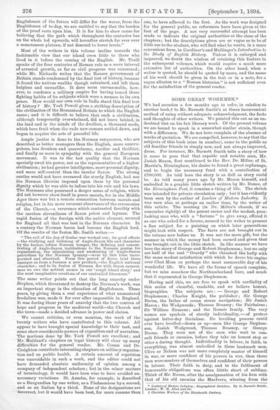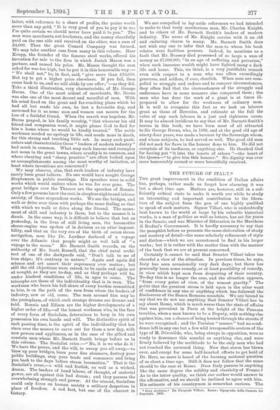SOME GREAT WORKMEN.* WE had occasion a few months ago
to refer, in relation to another book,f to Mr. Barnett Smith's at times inconvenient method of using without adequate acknowledgment, the facts and thoughts of other writers. We pointed this out as an un- doubted blot on his fair literary work. Of the present volume we are bound to speak in a somewhat similar strain, though with a difference. We do not here complain of the absence of marks of quotation. We are compelled, however, to say that the subjects of this book (nine in number), come to the public as old familiar friends in simply new, and not always improved, dress. For instance, Mr. Barnett Smith tells a story of how it came to pass that that capable and notable man, Mr. Josiah Mason, first mentioned to the Rev, Dr. Miller, of St. Martin's, Birmingham, his desire to found a great orphanage, and .to begin the necessary fund with a contribution of £100,000. As told here the story is as dull as story could be. As told many years ago by Mr. Mason himself, and embodied in a graphic little sketch written by Mr. Bunce, of the Birmingham Post, it remains a thing of life. The sketch was intended for private circulation only ; but it has evidently been seen by the author of Leaders of Modern Industry. It was seen also, at perhaps an earlier time, by the writer of this article. The meeting (in Dr. Miller's church, if we remember rightly) of the potent rector and the modest, poor- looking man who, with a " fortune " to give away, offered it as one who asked for a favour, seemed to the writer to present a fine subject for a painting on which later generations might look with respect. The facts are not brought out in the volume now before us. It was not the mere gift, but the manner in which the money had been earned and given that was brought out in the little sketch. In like manner we have here the story of George and Robert Stephenson ; but we only see half of the real " Geordy " who thrashed the bully with the same modest satisfaction with which he drove his engine over Chat Moss on perhaps the most memorable day of his wonderful life. We have all the forms of speech complete, but we miss somehow the Northumberland burr, and much that it represented in George Stephenson.
Having said this, we are free to speak with cordiality of this series of cheerful, readable, and we believe honest, biographies. The subjects are : — George and Robert Stephenson; Charles Knight, the publisher ; Sir George Burns, the father of ocean steam navigation; Sir Josiah Mason ; the Wedgwoods ; Thomas Brassey ; the Fairbairns ; Sir William Siemens ; and the Rennie family. The very names are symbols of sturdy individuality, — of protest 'against latter-day Socialism. No levelling process could ever have levelled—down or up—men like George Stephen. son, Josiah Wedgwood, Thomas Brassey, or George Burns. They were not of the men who wait to con- sult friends or enemies, before they take an honest step or utter a daring thought. Individuality in labour, in faith, in everything, was almost embodied in these landmark men. Clive or Nelson was not more completely master of himself in war, or more confident of his powers in war, than these men were masters of themselves and confident of their powers in labour. Their faith in duty, and in the fulfilment of honourable obligations was often litttle short of sublime. Think of Mr. Burns, after the amalgamation of his firm with that of his old enemies the Maclvers, winning from the * Leaders of Modern Industry : Biographical Sketches. By G. Barnett Smith. London W. E. Allen and On.
1' Christian Workers of the Nineteenth Century. latter, with reference to a share of profits, the praise worth more than any gold, " It is very good of you to pay it to us ; I'm quite certain we should never have paid it to you." The men were merchants, not hucksters, and the money cheerfully paid on the one side and received on the other, was a sum of £4,000. Thus the great Cunard Company was formed. We may take another case from many in this volume. Herr Krupp, the founder of the famous steel works, offered his invention for sale to the firm in which Josiah Mason was a partner, and named his price. Mr. Mason thought the sum asked for was too high, but he put it in this honourable way:— "We shall not," he, in fact, said, " give more than £10,000. But try to get a higher price elsewhere. If you fail, then come back to us, and we will abide by our offer; "_aa they did. Take a third illustration, very characteristic, of Mr. George Burns. One of the most ardent of merchants, Mr. Barns was also one of the most devout and merciful of men. With his mind fixed on the great and far-reaching plans which he had all but made his own, he lost a favourite dog, and mourned for it as some men and women can mourn for the loss of a faithful friend. When the search was hopeless, Mr. Burns prayed, in his family worship, " that wherever his old friend and companion went, it might please God to find for him a home where he would be kindly treated." The noble workman needed no apology in life, and needs none in death, for this strong and touching little act. In many such parti- culars and characteristics these " leaders of modern industry " had much in common. What may such lessons and examples not mean in the great towns, where cruelty is so common, and where cheating and "sharp practice" are often looked upon as accomplishments among the most worthy of imitation, at least where inventions are concerned ?
We may observe, also, that such leaders of industry have rarely been great talkers. No one would have sought George Stephenson in public meetings. His speeches were in solid works which would endure when he was for ever gone. The great bridges over the Thames are the speeches of Rennie. Only a few persons knew the cost, in sleepless nights and intense anxiety, of these stupendous works. We see the bridges, and walk or drive over them with perhaps the same feeling as that with which we walk or drive along the Strand. The monu- ment of skill and industry is there, but to the masses it is dumb. In the same way, it is difficult to believe that but as yesterday, in the lives of still living men, the locomotive steam-engine was spoken of in derision as an utter impossi- bility, and that on the very eve of the birth of ocean steam navigation, men like Dr. Lardner declared of a voyage over the Atlantic that people might as well talk of " a voyage to the moon." Mr. Barnett Smith records, on the authority of Mr. Scott Russell, that the chief naval archi- tect of one of the dockyards said, " Don't talk to me of iron ships; it's contrary to nature." Again and again did science and art assert their supremacy over matter; but still the old objections were raised, to be again and again set at nought, as they are to-day, and as they perhaps will be, under kindred conditions of life, in ages to come. The triumphs are those of the individuality that is in man. The workman who bears his full share of every burden committed to him, is on the path of the men from whom the leaders of industry, new or old, come. The men around him may be the protoplasm, of which such strange dreams are dreamt and told. Rennie and Edison are the higher developments of a higher order of life,—of the honest workman who, in the face of every form of Socialism, determines to keep in his own possession his own hands and will. The distinctive spirit of each passing time, is the spirit of the individuality that has risen over the masses to carve out for them a new day, with new powers and appliances, as in the case of the gifted and resolute men whom Mr. Barnett Smith brings before us in this volume. The Socialist cries No, it is we who do it ! We have the power, and the will, to sweep you all away,—to blow up your bridges, burn your fine steamers, destroy your public buildings, stop your trade and commerce and bring you back to the days before steam locomotion." That is the Socialist's error,—a wild and foolish, as well as a wicked, dream. The leaders of hand labour, of thought, of material power, are all against this bad dream ; and they possess the overwhelming strength and power. At the utmost, Socialism could only force on human society a military despotism in place of freedom. A sad fact, but one of the clearest in history. We are compelled to lay aside references we had intended to make to that truly meritorious man, Mr. Charles Knight, and to others of Mr. Barnett Smith's leaders of modern industry. The name of Mr. Knight carries with it an old and enduring charm to many. Mr. Barnett Smith does not wish any one to infer that the men to whom his book relates were faultless persons. Indeed, he mentions as a fault that Mr. Brassey died possessed of so large a sum of money as £7,000,000, "in an age of suffering and privation," when such immense wealth might have lighted many a dark life and home. This, we think, is a very justifiable remark even with respect to a man who was often exceedingly generous, and seldom, if ever, churlish. When men are com. pelled to struggle and endure and to conquer circumstances, they often find that the circumstances of the struggle and endurance have in seine measure also conquered them ; the man who has done the work of a giant is at times ill- prepared to allow for the weakness of ordinary men. It is well to recognise this fact as we look on labours great as those of Hercules, and estimate at the full the value of any such labours in a just and righteous cause. It may be almost invidious to say that of Mr. Barnett Smith's heroes in this book, we have been most of all attracted to Sir George Burns, who, in 1889, and at the good old age of ninety-four years, was made a baronet by the Sovereign whom, and whose subjects, he had served so well. The good old man did not seek for flaws in the honour done to him. He did not complain of its tardiness, or anything else. He thanked God for having put "it into the hearts of others "—the heart of the Queen—" to give him this honour." No dignity was ever more honourably earned or more beautifully received.



































 Previous page
Previous page